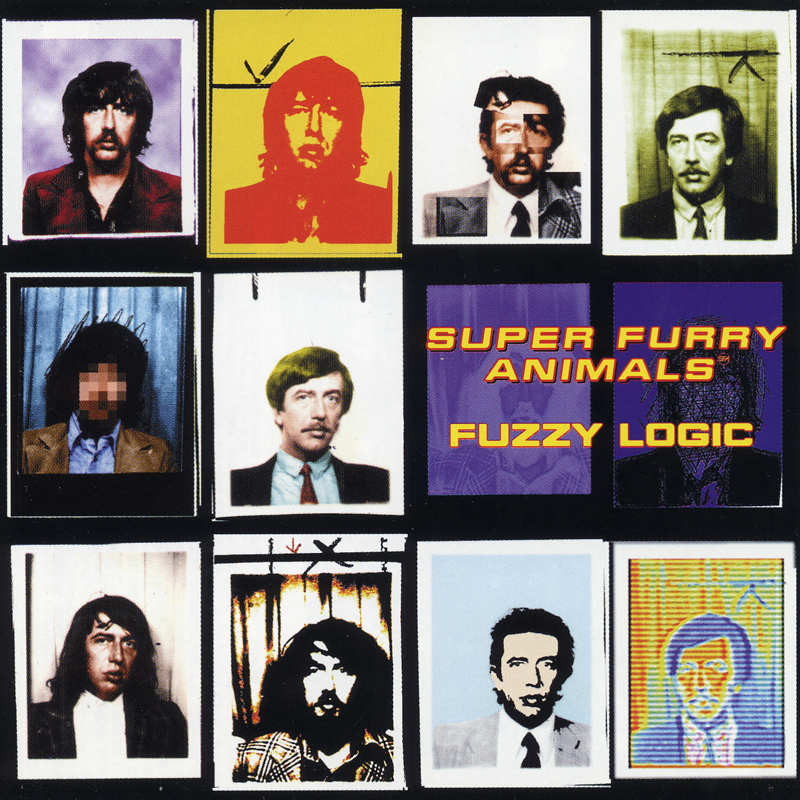Released at a time when seemingly every reasonably new(ish) band within the UK and Northern Ireland who featured at least one guitar player was pigeonholed as Britpop, Super Furry Animals’ Fuzzy Logic is an album that could have been mistakenly dismissed as landfill indie by those who found the whole scene devoid of inspiration. I know, because I very nearly did.
I discovered the singular delights of SFA in about 2003 after being prompted by a friend. She loaned me their entire back-catalogue up to that point and within a few days I had come to the conclusion that I had been drastically unfair in dismissing SFA as just another Britpop band, and that I had oh so nearly missed out on one of the finest acts in the history of popular song. Albums like Radiator, Rings Around the World and Phantom Power rapidly became firm favourites and I maintain to this day that they are some of the finest psych-pop albums released by anyone ever. In the excitement of immersing myself in the greatness of my favourite SFA albums, I perhaps unfairly overlooked their debut. Fuzzy Logic, although stylistically closer to Britpop than any other Super Furry Animals album, is ultimately too creative and frankly, too clever, to be lumped in with a scene that spent far too much time looking back, and nowhere near enough time looking forward (and yes, given I am Backseat Mafia’s resident ‘Not Forgotten’ writer, I am fully aware of my level of hypocrisy here). It is perhaps SFA’s ‘least unique’ album, however given that they remain one of the most unique acts in pop music, it’s still light years away from the generic sounds of the mid 90s.
While songs like “God! Show Me Magic!”, “Hometown Unicorn” and “If You Don’t Want Me to Destroy You” didn’t set the top of the singles charts alight, they need to be heard in the context of the lowest-common-denominator rubbish that made up at least two thirds of the big hits of the mid-90s. They are bright, brash, pop-songs laden with melody, phenomenal choruses and a sense of adventure. Gruff Rhys, even at this early stage in his career, possessed an immediately recognisable singing voice, which was warm, tuneful and capable of reaching depths of melancholy that his contemporaries were simply incapable of matching (just check out his vocals on “Gathering Moss” – he just sounds so emotionally invested in what he’s singing). SFA as a whole had already got a firm grasp on the dynamics of the perfect pop song, without sounding indebted to anyone. This was freewheeling psych-pop from the Welsh valleys, a geographical area often immune to the vagaries of fashion and rooted in the traditional values of paying your dues and not letting your ego run amok.
Another thing that sets Fuzzy Logic apart from its less interesting contemporaries is that it has so much more to offer than just its singles. Too many times in the mid-90s were albums released that, fair to middling hit singles aside, were pretty much entirely filler. With Fuzzy Logic, this simply wasn’t the case, as the vast majority of the songs were minor psych-pop masterpieces in their own right. “Fuzzy Birds” and alone demonstrates just how much more creative SFA were compared to those contemporaries who had a distinct lack of musical ambition. That’s not to say that SFA shirked fuzzed-up rock and roll guitar thrills, it’s just when they did embrace them, like on “Frisbee”, they did it in a way that was just a damn sight more interesting than almost anyone on the British music scene at the time, with the exception of Radiohead, who frankly, were a hell of a lot less cheery than the Super Furries.
Fuzzy Logic was an album I enjoyed when I first heard it, however with me listening to all of SFA’s albums in rapid chronological order, it was immediately eclipsed by their more sophisticated sounding albums from later in their career, and it is only in recent years that I have realised just how hands-down amazing it is. Precious few acts of the era released such a brilliantly realised debut as Super Furry Animals. In the realms of Britpop, Mansun managed it, as arguably did Suede and Supergrass. Beyond that, the field thins massively…
Listening back to it now, Fuzzy Logic still stands up, its joyously experimental pop enduring in a way that most of Britpop just doesn’t. It’s an album that has shone ever more brightly while its contemporaries have dulled over time. A hidden gem in the mire that makes you feel just a whole lot better about life.














No Comment